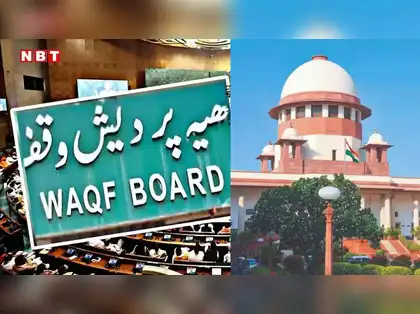By – Shubhendra Singh Rajawat
New Delhi, April 16, 2025 — The Supreme Court of India is set to hear a series of petitions today challenging the constitutional validity of the recently passed Waqf (Amendment) Act, 2025. The hearing will be conducted by a three-judge bench led by Chief Justice Sanjiv Khanna, Justice Sanjay Kumar, and Justice K.V. Viswanathan.
The petitions, filed by opposition parties, religious organizations, and NGOs, have sparked a nationwide debate on minority rights, religious freedom, and the constitutional limits of legislative power. In a significant development, the Union Government has also filed a caveat, requesting the Court to hear its arguments before passing any order.
Here are the 10 key points to understand the issue ahead of the crucial hearing:
1. Parliamentary Approval & Supreme Court Hearing
Earlier this month, the Waqf (Amendment) Bill was passed by both the Lok Sabha and Rajya Sabha after intense parliamentary debate. Today at 2 PM, the Supreme Court will begin hearing arguments related to the constitutionality of the amended law.
2. Legislative vs Judicial Jurisdiction
The Supreme Court had previously clarified that it does not interfere in the legislative domain. However, it agreed to hear these petitions, citing their relevance to constitutional rights, particularly the Right to Equality and Freedom of Religion under the Indian Constitution.

3. Who Filed the Petitions?
Petitioners include major political parties such as the Congress, RJD, AAP, DMK, TMC, YSR Congress, and CPI. Religious bodies like the Jamiat Ulema-e-Hind, All India Muslim Personal Law Board, and several NGOs have also approached the Court.
4. BJP-ruled States Seek Inclusion in Proceedings
Six BJP-governed states — Madhya Pradesh, Rajasthan, Chhattisgarh, Assam, Maharashtra, and Uttarakhand — have filed applications in the Supreme Court requesting to be impleaded in the case, expressing their interest in defending the new law.
5. Grounds of Challenge
The petitions argue that the amended law is arbitrary, discriminatory, and unconstitutional, demanding either its complete annulment or a stay on its implementation. Some petitioners claim the law unfairly targets the Muslim community and undermines their religious autonomy.
6. Owaisi’s Objection
AIMIM leader Asaduddin Owaisi filed a petition stating that the amendment weakens the protections historically granted to Waqf properties. He claims the law is discriminatory, as it dilutes safeguards for Muslim religious assets while keeping them intact for other religions.
7. AAP’s Argument
AAP MLA Amanatullah Khan argued in his petition that the inclusion of non-Muslim members in Waqf Boards violates Article 14 (Right to Equality), as it lacks any rational nexus with the administration of Muslim religious properties.
8. Government’s Stand
The Centre contends that the amendment is administrative, not religious. It states that Waqf properties have seen widespread mismanagement and misuse, with negligible benefits reaching the intended poor and marginalized Muslims, especially women and children. The law aims to introduce accountability and transparency.
9. Consultation and Process
The government claims the law is the result of wide consultations, including with non-Muslim minorities, and that it has been reviewed by a Joint Parliamentary Committee. Several suggested amendments were incorporated before the law was passed.
10. Nationwide Protests and Unrest
The new Waqf law has triggered protests across the country, with violent clashes reported in states like West Bengal, where three people lost their lives and many were displaced during demonstrations. West Bengal CM Mamata Banerjee has publicly stated her government will not implement the amended Waqf law in the state.
As the Supreme Court begins deliberations, the case is set to become a landmark moment in the ongoing debate over minority rights, secularism, and state control over religious properties in India. The nation now awaits whether the judiciary will uphold or strike down the contentious provisions of the Waqf (Amendment) Act, 2025.


Разыскиваете надежную помощь в наведении порядка вашей в Санкт-Петербурге? Наша команда специалистов гарантирует чистоту и порядок в вашем доме! Мы используем только безопасные для здоровья и эффективные средства, чтобы вы могли наслаждаться свежестью без хлопот. Тапайте https://klining-uslugi24.ru – Клининговая компания уборка квартир Не упустите шанс сделать свою жизнь проще и удобнее.
Планируйте свой экзотический отпуск уже сегодня.
Оферти за екзотични почивки https://www.ekzotichni-pochivki.com/ .
Лучшие коллекции дизайнерской мебели премиум-класса.
Мебель премиум https://byfurniture.by/ .
Hello. . don-rem.ru
https://don-rem.ru
https://don-rem.ru zwz4967494
Советы по выбору куклы бебета.
Изкуствено бебе кукли като истински бебета цени https://www.kukli-bebeta.com .
Игрушки для релаксации и отдыха.
Фиджет антистрес играчки https://antistres-igrachki.com .
hi
Как сделать интерьер стильным с помощью дизайнерской мебели.
Мебель премиум Мебель премиум .